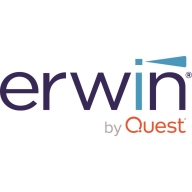

Segment and erwin Data Intelligence by Quest are products in the data management and intelligence space. erwin Data Intelligence by Quest appears to have the upper hand with its comprehensive features, justifying its higher cost.
Features: Segment provides real-time data management, seamless integration capabilities, and cost-effective data handling. erwin Data Intelligence by Quest offers robust data governance, advanced analytics, and extensive data oversight features.
Ease of Deployment and Customer Service: Segment features a simple and quick deployment process with highly responsive customer service. erwin Data Intelligence requires a more complex setup due to its advanced features yet is supported by strong technical assistance.
Pricing and ROI: Segment presents more accessible setup costs and demonstrates clear ROI through its cost-effective solutions. erwin Data Intelligence requires a higher initial investment but offers significant ROI with its extensive feature set, providing long-term value.


The erwin Data Intelligence Suite (erwin DI) combines data catalog and data literacy capabilities for greater awareness of and access to available data assets, guidance on their use, and guardrails to ensure data policies and best practices are followed. Automatically harvest, transform and feed metadata from a wide array of data sources, operational processes, business applications and data models into a central data catalog. Then make it accessible and understandable within context via role-based views. This complete metadata-driven approach to data governance facilitates greater IT and business collaboration.
Segment is a customer data platform that helps organizations collect, unify, and analyze customer data from various sources. Its primary use case is to provide a single view of the customer across different touchpoints, enabling businesses to deliver personalized experiences.
The most valuable functionality of Segment is its ability to integrate with numerous data sources, such as websites, mobile apps, and third-party tools. It simplifies the process of data collection and unification, allowing organizations to easily access and analyze customer data in real time.
Segment helps organizations by providing a comprehensive understanding of their customer's behavior, preferences, and interactions. This valuable insight enables businesses to make data-driven decisions, optimize marketing campaigns, and improve customer engagement. By leveraging Segment's capabilities, organizations can enhance customer experiences, increase customer satisfaction, and drive business growth.
We monitor all Data Governance reviews to prevent fraudulent reviews and keep review quality high. We do not post reviews by company employees or direct competitors. We validate each review for authenticity via cross-reference with LinkedIn, and personal follow-up with the reviewer when necessary.